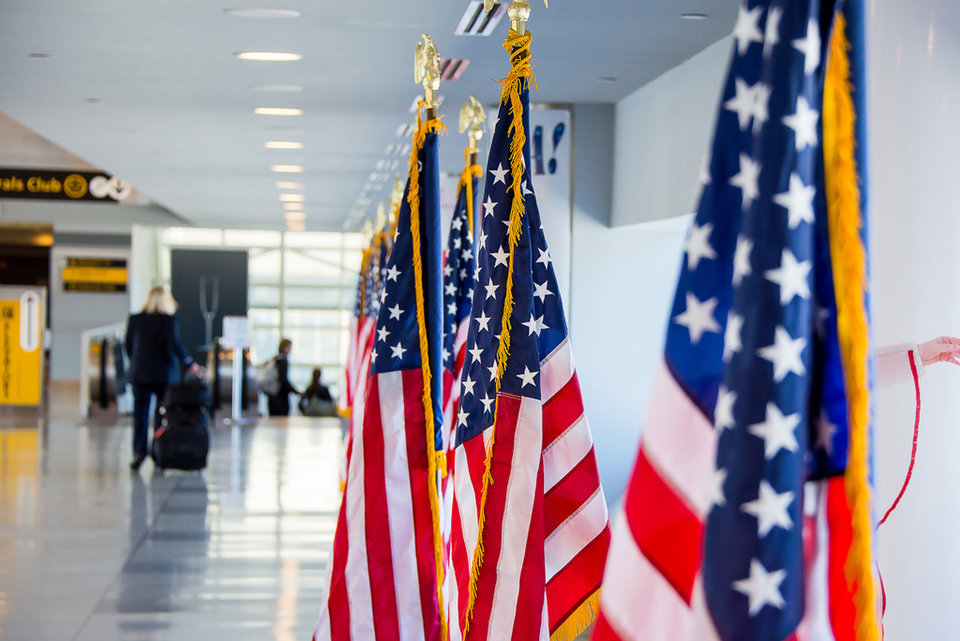Caption. Image:
Industry Focus
Biden 2020: reaction from around the aviation industry
After an intense few days, Joe Biden has been elected the next president of the United States. In the week after the election, Ilaria Grasso Macola rounded up reaction from all corners of the aviation industry.
Presidential candidate Joe Biden is set to become America’s 46th president after winning the 2020 elections against President Donald Trump.
Despite unverified claims of electoral fraud from the Trump administration as well as from supporters, Biden – alongside VP Kamala Harris – is preparing for the transition period, setting up a Covid-19 response taskforce for January 2021.
During his campaign, Biden pledged to rebuild the struggling aviation sector while reducing greenhouse gas emissions.
In his presidential manifesto, Biden promised to commit $400bn over ten years for the development of clean energy innovation, as well as improve US airports by increasing funding to the Federal Aviation Administration Airport Improvement Programme, which provides a grant to agencies for the development of airports.
As the inauguration date is less than three months away, what does the aviation industry think of the new president? How will the Biden administration differ from Trump’s regarding not only the US but global aviation?
Making long-term investments to modernise aviation
The Aviation Council International (ACI) was one of the first aviation organisations to congratulate Biden on his victory, stating it looked forward to working alongside his administration.
“On behalf of airports around the country, we congratulate President-elect Joe Biden and all of the incoming members of Congress,” said ACI North America president and CEO Kevin M. Burke in a press release.
“We remain grateful the President-elect supports increasing the Passenger Facility Charge so that airports across the country can make the long-term investments they need to modernise our entire aviation infrastructure,” he added.
During a candidate forum in February, Biden had indeed expressed his support to increase the federal limit for the Passenger Facility Charge, a user fee that airports use to repair facilities as well as enhance passenger experiences. In the last 20 years, the fee’s price has remained capped at $4.50, becoming increasingly insufficient to improve infrastructure.
The organisation also stressed the need for the new administration to help aviation get back on its feet after Covid-19.
“Congress still needs to pass a comprehensive Covid-19 relief package that includes much-needed funds for airports struggling to finance operations, [as well as] make debt payments and respond to the pandemic by retrofitting their facilities and adopting enhanced sanitation and health protocols,” Burke concluded.
“The entire travel industry is still suffering from the abrupt, sustained drop in tourism and business travel, and airports need help to get through this prolonged downturn.”

Credit: Shutterstock / DimaBerlin
Reviving the industry after Covid-19
“We applaud President-elect Biden’s objective of helping the industries most heavily impacted by the pandemic, said US Travel Association President and CEO Roger Dow in a press release.
“The travel industry accounts for more than a third of overall US unemployment, and policies to promote relief, recovery and stimulus for travel businesses are integral to a US economic turnaround.
The association echoed other stakeholders and reiterated the need to revive industries that were hit the hardest by the Covid-19 pandemic, such as travel.
“The right combination of technologies and behaviours already exists to allow the restart of travel without compromising health and safety and making rapid and reliable testing more widely available will be a key element of an even broader economic reopening,” Dow continued.
“We stand ready to work closely with the Biden administration and both chambers of Congress to achieve policy goals that revive our economy and bring our country together—a hallmark of the travel industry,” he concluded.
Open skies policies
According to the University of Surrey’s school of hospitality and tourism management Dr Frankie O’Connell, the Biden administration will benefit aviation, boosting international tourism into the country.
“This new government will promote trade and tourism into the United States which will significantly boost air traffic across the North Atlantic,” he explains. “There will be more open skies policies initiated which will further drive global airline traffic.”
Open skies agreements eliminate government interference, therefore allowing airlines to make their decisions on routes and pricing.
According to the US Department of State, open skies agreements have “vastly expanded international passenger and cargo flights to and from the United States, promoting increased travel and trade, enhancing productivity, and spurring high-quality job opportunities and economic growth”.

Credit: Shutterstock / Ingus Kruklitis
A more welcoming US?
Buckinghamshire New University aviation management senior lecturer Francesco Ragni believes that, overall, Biden’s victory is good news for aviation.
“Trump’s administration hasn’t done a great job in encouraging international travel with its anti-immigration policy and controversial decisions such as the Muslim ban in 2017 and more recently a very restrictive Covid-19 travel ban,” he says. “Under Biden, I think we can expect fewer restrictions, more consistent policies and in general a more open and welcoming US, and that will help aviation.”
According to Ragni, Biden’s pledge to put the environment at the centre of politics will not impact the industry negatively.
“Biden has promised to put the environment and climate change back in the political agenda. But I don’t think this will have a negative effect on aviation,” he adds.
“The industry overall has a great understanding of the environmental issues to address. Industry bodies, as well as individual airlines and airports, have already set ambitious goals to become greener and started concrete actions. Airlines have invested massively in cleaner fleets and in adopting flying practices to reduce emissions. Greater pressure from the US will not find them unprepared.”
“Finally, in terms of funding and support to US aviation and travel industry during the pandemic, I believe there won’t be significant differences. Biden might choose different ways to do that but will continue to support the industry as Trump has done,” Ragni concludes.
“In his programme, he has expressed the intention to build extensive rail infrastructure, but that sounds like a long-term plan. In the short/medium term, there is no doubt that aviation remains the only way to keep the US well connected.
Rebuilding the administration after Covid-19
“Stopping the spread of Covid-19 and getting help to struggling workers and businesses must be the new administration’s first priority,” said EDF president Fred Krupp in a press statement.
The environmental non-governmental organisations applauded Biden’s commitment to the environment while reiterating the need to build a better and cleaner infrastructure system.
“But as we turn to the work of rebuilding better — not simply restoring what we had before — it is time to get to work building clean cars, trucks and buses and clean energy, for an America with less pollution, more jobs and equity for our hardest-hit communities,” he added.
Main image credit: Stratos Brilakis / Shutterstock.com